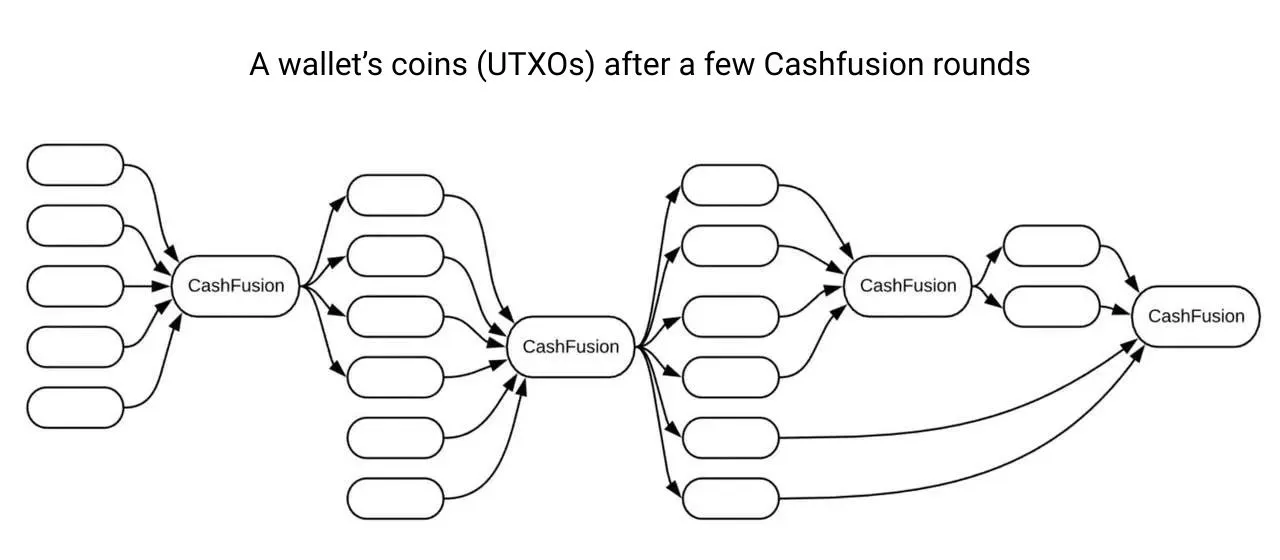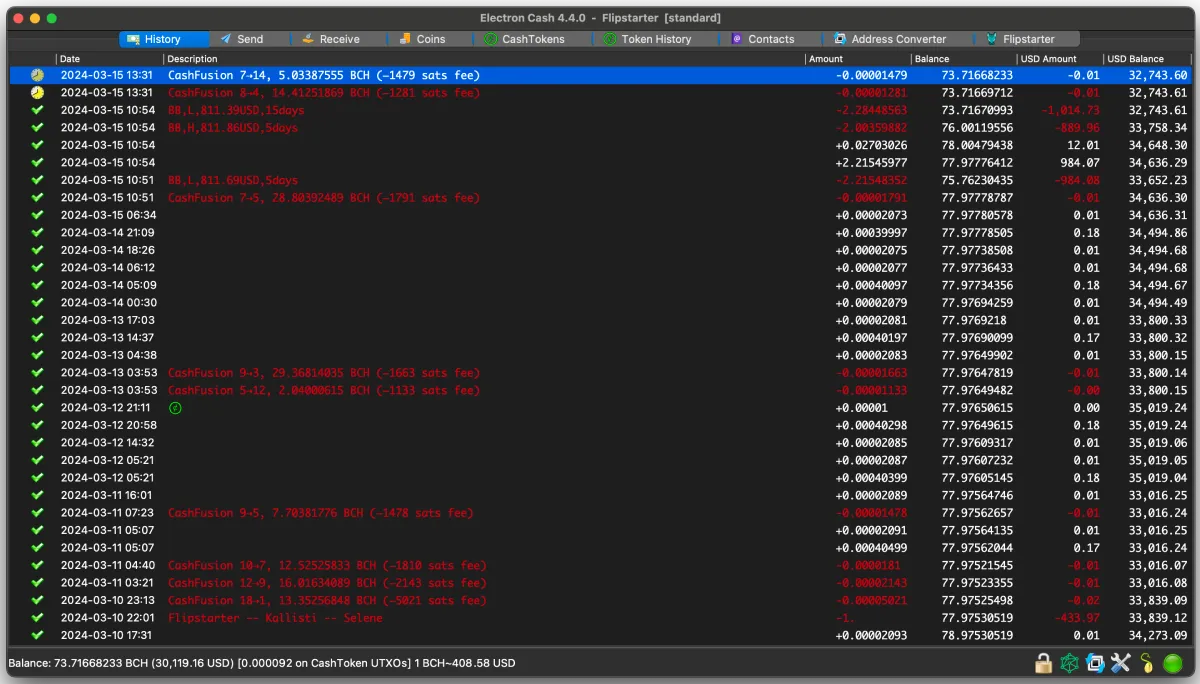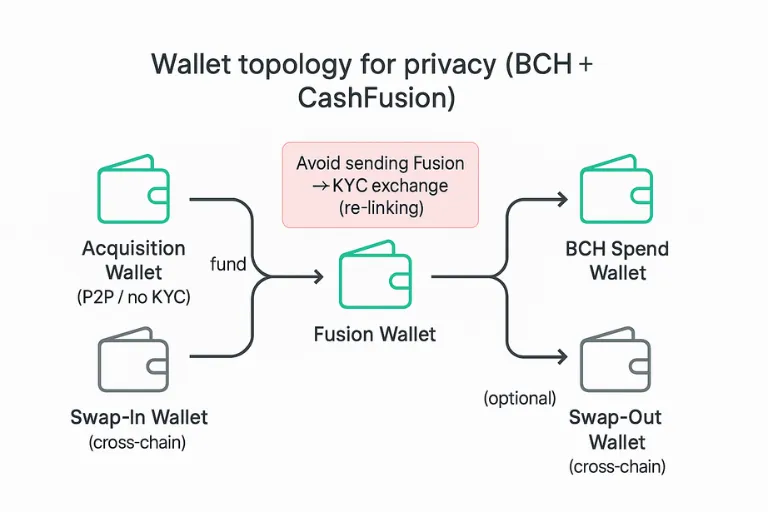No one needs to know what you hold or how you spend it.
Without privacy, every payment you make on a transparent blockchain can expose your balance and spending habits to anyone who cares to look.
CashFusion is Bitcoin Cash’s flagship privacy solution for fixing this. This is an educational guide and does not constitute legal or tax advice.
What is CashFusion?
CashFusion is a non‑custodial privacy protocol that makes Bitcoin Cash coins untraceable.
Through a coordination mechanism, multiple users form a transaction with many inputs and outputs to themselves, breaking naïve address clustering and making each coin's trail impossible to determine — their origin becomes unidentifiable (if users don't mess up afterwards; more on this below).

Image credit: telegram user Adaptive Blocksize Limit
What it does and doesn’t
Optionally jump to:
Interface step by step ↓
How does it anonymize BCH?
Cashfusion transactions have an astronomical number of possible input→output assignments. As participants and outputs grow, the space of plausible mappings explodes, and the coins' true origins are lost among ~infinite possibilities.
Example: a standard cashfusion transaction with 77 inputs and 63 outputs implies roughly 6.1×10^146 possible input→output mappings. Even if a supercomputer checked 100 million possibilities per second, it would take 1.9×10^129 years to find out where a coin/UTXO comes from. In practical terms, tracing is broken — the BCH can't be traced unless you mess up afterwards. More on this below.
User coordination runs automatically in the background through a server that orchestrates each round, with traffic routed over TOR (The Onion Router) — the coordination server cannot see your IP. You simply send your own inputs to fresh addresses of your wallet; the coordinator has no control of anyone's funds. Coordinators simply assemble the input references and propose the outputs needed for a joint transaction, which are registered in separate phases to reduce linkage.
Successful independent Cashfusion audit
In July 2020, Kudelski Security reviewed CashFusion and concluded that the protocol offers a practical way to fuse transactions without the server being able to steal funds or deanonymize users, and found no evidence of malicious intent, flawed logic, or potential backdoor in the code. Read the full Cashfusion audit→ (PDF).

How Cashfusion transactions appear in the Electron Cash desktop wallet.
Image credit: Electron Cash website
How to use Cashfusion — Step‑by‑step
If you don’t yet own BCH, we have an article explaining how to buy Bitcoin Cash anonymously with fiat→
Cashfusion costs and time expectations
Cashfusion privacy involves no costs other than BCH transaction fees (typically <$0.01).
How long it takes depends on liquidity (how many peers are coordinating). Expect variability: sometimes minutes, sometimes longer. Keep Electron Cash open for a bit so fusion can progress in the background.
Frequently Asked Questions
No. With CashFusion, technically, you don’t receive anyone else’s coins.
You send your own coins to yourself as part of a large coordinated transaction that includes many participants doing the same. The result is that every participant ends up with new outputs that belong only to them, but it becomes mathematically impossible to determine which inputs produced which outputs. After fusion, your coins remain yours, but their history is no longer traceable to the previous UTXOs. This breaks the concept of “taint” — once fused, no observer can identify coins as coming from any specific origin.
CashFusion breaks transaction traceability: after fusion, it’s statistically impossible to determine the origin of any given coin. Paired with Bitcoin Cash’s publicly auditable finite supply, that makes BCH one of the soundest forms of money ever created.
Privacy-focused coins like Monero or Zcash operate on fully opaque ledgers, which makes their total supply impossible to verify. If a hidden inflation bug existed, it could go unnoticed indefinitely. That opacity appeals to niches like dark web markets that depend on full invisibility, but it’s not a foundation for global money. BCH will never replace these niche use-cases.
For a global currency, the total supply needs to be verifiable. Bitcoin Cash achieves this: CashFusion gives cash-like privacy — like using paper bills in the street — without sacrificing ledger transparency or trust in the system.
No. It’s coordinated, not custodial. You send your own coins to yourself as part of a group round — many participants collaboratively build a multi‑input, multi‑output transaction that returns funds to fresh addresses they control. Your keys never leave your device, and nobody else can move your funds. Coordination is provided by independent servers, and compatible wallets can switch between them.
Best practices for crypto anonymity

Nothing beats starting with coins that were acquired without KYC and having BCH in an unidentified wallet.
To learn how to buy crypto anonymously, check our guide: Buy Bitcoin Cash Anonymously with fiat→
Once you have BCH, It's best to separate your activity by wallet purpose:
This simple separation prevents accidental re-linking and keeps your fused coins private across wallets.
Advanced tip: avoid combining multiple fused UTXOs into a single transaction when moving funds to your spending wallet. Spending one fused UTXO at a time preserves unlinkability between your coins.

